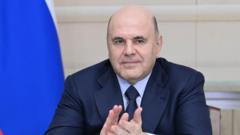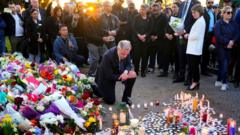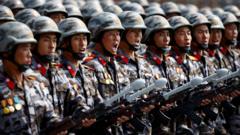North Korea and Russia broke ground on their first road bridge spanning the Tumen River, marking a significant enhancement in bilateral relations as North Korea provides military support to Russia in its war against Ukraine.
North Korea and Russia Forge New Road Bridge of Cooperation

North Korea and Russia Forge New Road Bridge of Cooperation
A new bridge symbolizes the strengthening ties between North Korea and Russia amid ongoing conflict in Ukraine.
North Korea and Russia announced an important step in their growing partnership with the groundbreaking of a two-lane road bridge over the Tumen River, which connects the two nations. This ceremony was held simultaneously on both sides of the border as part of a collaborative effort to deepen relations that have blossomed since North Korea began supplying military aid to Russia in 2023.
Prime Minister Mikhail Mishustin of Russia referred to the bridge as a major achievement for Russian-Korean relations, during a video link with North Korean leader Pak Thae-song, who hailed the structure as a "historic monument" reflecting the commitment of both nations to foster closer ties. The bridge is set to be just over half a mile long, with an anticipated construction timeline of 18 months.
Currently, the nations share a railway link, but the new bridge aims to enhance the flow of both commercial and passenger traffic, along with tourism opportunities once it is completed. This development follows a historic agreement reached during President Vladimir Putin's visit to Pyongyang in June 2024, which established a comprehensive strategic partnership with promises of mutual aid and economic cooperation.
Since 2023, relations between North Korea and Russia have transformed dramatically, fueled by North Korea’s provision of artillery and missile support for Russia's military operations in Ukraine. The closer alliance includes North Korea dispatching troops to assist in military campaigns, confirming deployments of approximately 15,000 soldiers, with significant casualties reported.
In return, Russia has provided North Korea with advanced military technology, including air defense systems and drones. North Korean officials have also reported a substantial influx of Russian military technology aimed at bolstering North Korea's capabilities. As both nations continue to navigate their geopolitical ambitions, the new bridge symbolizes not just a physical connection but the merging of two isolationist states seeking strength through cooperation.
Prime Minister Mikhail Mishustin of Russia referred to the bridge as a major achievement for Russian-Korean relations, during a video link with North Korean leader Pak Thae-song, who hailed the structure as a "historic monument" reflecting the commitment of both nations to foster closer ties. The bridge is set to be just over half a mile long, with an anticipated construction timeline of 18 months.
Currently, the nations share a railway link, but the new bridge aims to enhance the flow of both commercial and passenger traffic, along with tourism opportunities once it is completed. This development follows a historic agreement reached during President Vladimir Putin's visit to Pyongyang in June 2024, which established a comprehensive strategic partnership with promises of mutual aid and economic cooperation.
Since 2023, relations between North Korea and Russia have transformed dramatically, fueled by North Korea’s provision of artillery and missile support for Russia's military operations in Ukraine. The closer alliance includes North Korea dispatching troops to assist in military campaigns, confirming deployments of approximately 15,000 soldiers, with significant casualties reported.
In return, Russia has provided North Korea with advanced military technology, including air defense systems and drones. North Korean officials have also reported a substantial influx of Russian military technology aimed at bolstering North Korea's capabilities. As both nations continue to navigate their geopolitical ambitions, the new bridge symbolizes not just a physical connection but the merging of two isolationist states seeking strength through cooperation.




















